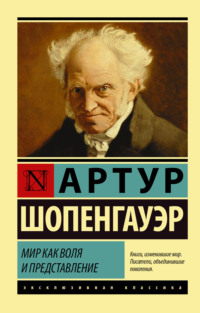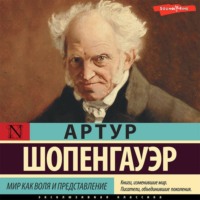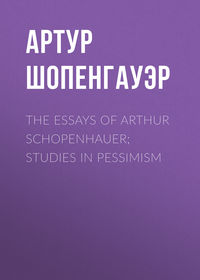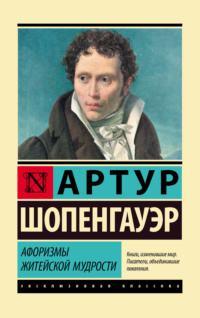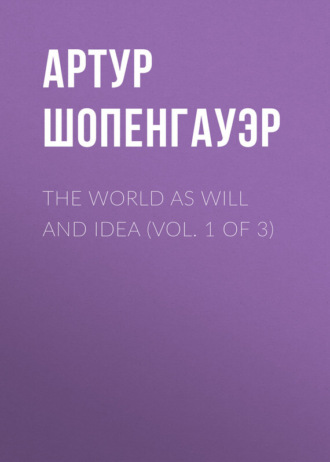 полная версия
полная версияThe World as Will and Idea (Vol. 1 of 3)
Now that we have shown clearly in these pages the unalterable nature of the empirical character, which is just the unfolding of the intelligible character that lies outside time, together with the necessity with which actions follow upon its contact with motives, we hasten to anticipate an argument which may very easily be drawn from this in the interest of bad dispositions. Our character is to be regarded as the temporal unfolding of an extra-temporal, and therefore indivisible and unalterable, act of will, or an intelligible character. This necessarily determines all that is essential in our conduct in life, i. e., its ethical content, which must express itself in accordance with it in its phenomenal appearance, the empirical character; while only what is unessential in this, the outward form of our course of life, depends upon the forms in which the motives present themselves. It might, therefore, be inferred that it is a waste of trouble to endeavour to improve one's character, and that it is wiser to submit to the inevitable, and gratify every inclination at once, even if it is bad. But this is precisely the same thing as the theory of an inevitable fate which is called αργος λογος, and in more recent times Turkish faith. Its true refutation, as it is supposed to have been given by Chrysippus, is explained by Cicero in his book De Fato, ch. 12, 13.
Though everything may be regarded as irrevocably predetermined by fate, yet it is so only through the medium of the chain of causes; therefore in no case can it be determined that an effect shall appear without its cause. Thus it is not simply the event that is predetermined, but the event as the consequence of preceding causes; so that fate does not decide the consequence alone, but also the means as the consequence of which it is destined to appear. Accordingly, if some means is not present, it is certain that the consequence also will not be present: each is always present in accordance with the determination of fate, but this is never known to us till afterwards.
As events always take place according to fate, i. e., according to the infinite concatenation of causes, so our actions always take place according to our intelligible character. But just as we do not know the former beforehand, so no a priori insight is given us into the latter, but we only come to know ourselves as we come to know other persons a posteriori through experience. If the intelligible character involved that we could only form a good resolution after a long conflict with a bad disposition, this conflict would have to come first and be waited for. Reflection on the unalterable nature of the character, on the unity of the source from which all our actions flow, must not mislead us into claiming the decision of the character in favour of one side or the other; it is in the resolve that follows that we shall see what manner of men we are, and mirror ourselves in our actions. This is the explanation of the satisfaction or the anguish of soul with which we look back on the course of our past life. Both are experienced, not because these past deeds have still an existence; they are past, they have been, and now are no more; but their great importance for us lies in their significance, lies in the fact that these deeds are the expression of the character, the mirror of the will, in which we look and recognise our inmost self, the kernel of our will. Because we experience this not before, but only after, it behoves us to strive and fight in time, in order that the picture we produce by our deeds may be such that the contemplation of it may calm us as much as possible, instead of harassing us. The significance of this consolation or anguish of soul will, as we have said, be inquired into farther on; but to this place there belongs the inquiry which follows, and which stands by itself.
Besides the intelligible and the empirical character, we must mention a third which is different from them both, the acquired character, which one only receives in life through contact with the world, and which is referred to when one is praised as a man of character or censured as being without character. Certainly one might suppose that, since the empirical character, as the phenomenon of the intelligible, is unalterable, and, like every natural phenomenon, is consistent with itself, man would always have to appear like himself and consistent, and would therefore have no need to acquire a character artificially by experience and reflection. But the case is otherwise, and although a man is always the same, yet he does not always understand himself, but often mistakes himself, till he has in some degree acquired real self-knowledge. The empirical character, as a mere natural tendency, is in itself irrational; nay, more, its expressions are disturbed by reason, all the more so the more intellect and power of thought the man has; for these always keep before him what becomes man in general as the character of the species, and what is possible for him both in will and in deed. This makes it the more difficult for him to see how much his individuality enables him to will and to accomplish. He finds in himself the germs of all the various human pursuits and powers, but the difference of degree in which they exist in his individuality is not clear to him in the absence of experience; and if he now applies himself to the pursuits which alone correspond to his character, he yet feels, especially at particular moments and in particular moods, the inclination to directly opposite pursuits which cannot be combined with them, but must be entirely suppressed if he desires to follow the former undisturbed. For as our physical path upon earth is always merely a line, not an extended surface, so in life, if we desire to grasp and possess one thing, we must renounce and leave innumerable others on the right hand and on the left. If we cannot make up our minds to this, but, like children at the fair, snatch at everything that attracts us in passing, we are making the perverse endeavour to change the line of our path into an extended surface; we run in a zigzag, skip about like a will o' the wisp, and attain to nothing. Or, to use another comparison, as, according to Hobbes' philosophy of law, every one has an original right to everything but an exclusive right to nothing, yet can obtain an exclusive right to particular things by renouncing his right to all the rest, while others, on their part, do likewise with regard to what he has chosen; so is it in life, in which some definite pursuit, whether it be pleasure, honour, wealth, science, art, or virtue, can only be followed with seriousness and success when all claims that are foreign to it are given up, when everything else is renounced. Accordingly, the mere will and the mere ability are not sufficient, but a man must also know what he wills, and know what he can do; only then will he show character, and only then can he accomplish something right. Until he attains to that, notwithstanding the natural consistency of the empirical character, he is without character. And although, on the whole, he must remain true to himself, and fulfil his course, led by his dæmon, yet his path will not be a straight line, but wavering and uneven. He will hesitate, deviate, turn back, lay up for himself repentance and pain. And all this is because, in great and small, he sees before him all that is possible and attainable for man in general, but does not know what part of all this is alone suitable for him, can be accomplished by him, and is alone enjoyable by him. He will, therefore, envy many men on account of a position and circumstances which are yet only suitable to their characters and not to his, and in which he would feel unhappy, if indeed he found them endurable at all. For as a fish is only at home in water, a bird in the air, a mole in the earth, so every man is only at home in the atmosphere suitable to him. For example, not all men can breathe the air of court life. From deficiency of proper insight into all this, many a man will make all kinds of abortive attempts, will do violence to his character in particulars, and yet, on the whole, will have to yield to it again; and what he thus painfully attains will give him no pleasure; what he thus learns will remain dead; even in an ethical regard, a deed that is too noble for his character, that has not sprung from pure, direct impulse, but from a concept, a dogma, will lose all merit, even in his own eyes, through subsequent egoistical repentance. Velle non discitur. We only become conscious of the inflexibility of another person's character through experience, and till then we childishly believe that it is possible, by means of rational ideas, by prayers and entreaties, by example and noble-mindedness, ever to persuade any one to leave his own way, to change his course of conduct, to depart from his mode of thinking, or even to extend his capacities: so is it also with ourselves. We must first learn from experience what we desire and what we can do. Till then we know it not, we are without character, and must often be driven back to our own way by hard blows from without. But if we have finally learnt it, then we have attained to what in the world is called character, the acquired character. This is accordingly nothing but the most perfect knowledge possible of our own individuality. It is the abstract, and consequently distinct, knowledge of the unalterable qualities of our own empirical character, and of the measure and direction of our mental and physical powers, and thus of the whole strength and weakness of our own individuality. This places us in a position to carry out deliberately and methodically the rôle which belongs to our own person, and to fill up the gaps which caprices or weaknesses produce in it, under the guidance of fixed conceptions. This rôle is in itself unchangeably determined once for all, but hitherto we have allowed it to follow its natural course without any rule. We have now brought to distinct conscious maxims which are always present to us the form of conduct which is necessarily determined by our own individual nature, and now we conduct it in accordance with them as deliberately as if we had learned it; without ever falling into error through the passing influence of the mood or the impression of the present, without being checked by the bitterness or sweetness of some particular thing we meet with on our path, without delay, without hesitation, without inconsistency. We shall now no longer, as novices, wait, attempt, and grope about in order to see what we really desire and are able to do, but we know this once for all, and in every choice we have only to apply general principles to particular cases, and arrive at once at a decision. We know our will in general, and do not allow ourselves to be led by the passing mood or by solicitations from without to resolve in particular cases what is contrary to it as a whole. We know in the same way the nature and the measure of our strength and our weakness, and thereby are spared much suffering. For we experience no real pleasure except in the use and feeling of our own powers, and the greatest pain is the conscious deficiency of our powers where we need them. If, now, we have discovered where our strength and our weakness lie, we will endeavour to cultivate, employ, and in every way make use of those talents which are naturally prominent in us. We will always turn to those occupations in which they are valuable and to the purpose, and entirely avoid, even with self-renunciation, those pursuits for which we have naturally little aptitude; we will beware of attempting that in which we have no chance of succeeding. Only he who has attained to this will constantly and with full consciousness be completely himself, and will never fail himself at the critical moment, because he will always have known what he could expect from himself. He will often enjoy the satisfaction of feeling his strength, and seldom experience the pain of being reminded of his weakness. The latter is mortification, which causes perhaps the greatest of mental sufferings; therefore it is far more endurable to have our misfortune brought clearly before us than our incapacity. And, further, if we are thus fully acquainted with our strength and our weakness, we will not attempt to make a show of powers which we do not possess; we will not play with base coin, for all such dissimulation misses the mark in the end. For since the whole man is only the phenomenon of his will, nothing can be more perverse than to try, by means of reflection, to become something else than one is, for this is a direct contradiction of the will with itself. The imitation of the qualities and idiosyncrasies of others is much more shameful than to dress in other people's clothes; for it is the judgment of our own worthlessness pronounced by ourselves. Knowledge of our own mind and its capacities of every kind, and their unalterable limits, is in this respect the surest way to the attainment of the greatest possible contentment with ourselves. For it holds good of inward as of outward circumstances that there is for us no consolation so effective as the complete certainty of unalterable necessity. No evil that befalls us pains us so much as the thought of the circumstances by which it might have been warded off. Therefore nothing comforts us so effectually as the consideration of what has happened from the standpoint of necessity, from which all accidents appear as tools in the hand of an overruling fate, and we therefore recognise the evil that has come to us as inevitably produced by the conflict of inner and outer circumstances; in other words, fatalism. We really only complain and storm so long as we hope either to affect others or to excite ourselves to unheard-of efforts. But children and grown-up people know very well to yield contentedly as soon as they clearly see that it absolutely cannot be otherwise: – Θυμὸν ἐνὶ στήθεσσι φίλον δαμάσσαντες ἀνάγκη (Animo in pectoribus nostro domito necessitate). We are like the entrapped elephants, that rage and struggle for many days, till they see that it is useless, and then suddenly offer their necks quietly to the yoke, tamed for ever. We are like King David, who, as long as his son still lived, unceasingly importuned Jehovah with prayers, and behaved himself as if in despair; but as soon as his son was dead, thought no longer about it. Hence it arises that innumerable permanent ills, such as lameness, poverty, low estate, ugliness, a disagreeable dwelling-place, are borne with indifference by innumerable persons, and are no longer felt, like healed wounds, just because these persons know that inward or outward necessity renders it impossible that any change can take place in these things; while those who are more fortunate cannot understand how such misfortunes can be borne. Now as with outward necessity, so also with inward; nothing reconciles so thoroughly as a distinct knowledge of it. If we have once for all distinctly recognised not only our good qualities and our strength, but also our defects and weakness, established our aim accordingly, and rest satisfied concerning what cannot be attained, we thus escape in the surest way, as far as our individuality permits, the bitterest of all sorrows, discontentment with ourselves, which is the inevitable result of ignorance of our own individuality, of false conceit and the audacity that proceeds from it. To the bitter chapter of the self-knowledge here recommended the lines of Ovid admit of excellent application —
“Optimus ille animi vindex lædentia pectus,Vincula qui rupit, dedoluitque semel.”So much with regard to the acquired character, which, indeed, is not of so much importance for ethics proper as for life in the world. But its investigation was related as that of a third species to the investigation of the intelligible and the empirical character, in regard to which we were obliged to enter upon a somewhat detailed inquiry in order to bring out clearly how in all its phenomena the will is subject to necessity, while yet in itself it may be called free and even omnipotent.
§ 56. This freedom, this omnipotence, as the expression of which the whole visible world exists and progressively develops in accordance with the laws which belong to the form of knowledge, can now, at the point at which in its most perfect manifestation it has attained to the completely adequate knowledge of its own nature, express itself anew in two ways. Either it wills here, at the summit of mental endowment and self-consciousness, simply what it willed before blindly and unconsciously, and if so, knowledge always remains its motive in the whole as in the particular case. Or, conversely, this knowledge becomes for it a quieter, which appeases and suppresses all willing. This is that assertion and denial of the will to live which was stated above in general terms. As, in the reference of individual conduct, a general, not a particular manifestation of will, it does not disturb and modify the development of the character, nor does it find its expression in particular actions; but, either by an ever more marked appearance of the whole method of action it has followed hitherto, or conversely by the entire suppression of it, it expresses in a living form the maxims which the will has freely adopted in accordance with the knowledge it has now attained to. By the explanations we have just given of freedom, necessity, and character, we have somewhat facilitated and prepared the way for the clearer development of all this, which is the principal subject of this last book. But we shall have done so still more when we have turned our attention to life itself, the willing or not willing of which is the great question, and have endeavoured to find out generally what the will itself, which is everywhere the inmost nature of this life, will really attain by its assertion – in what way and to what extent this assertion satisfies or can satisfy the will; in short, what is generally and mainly to be regarded as its position in this its own world, which in every relation belongs to it.
First of all, I wish the reader to recall the passage with which we closed the Second Book, – a passage occasioned by the question, which met us then, as to the end and aim of the will. Instead of the answer to this question, it appeared clearly before us how, in all the grades of its manifestation, from the lowest to the highest, the will dispenses altogether with a final goal and aim. It always strives, for striving is its sole nature, which no attained goal can put an end to. Therefore it is not susceptible of any final satisfaction, but can only be restrained by hindrances, while in itself it goes on for ever. We see this in the simplest of all natural phenomena, gravity, which does not cease to strive and press towards a mathematical centre to reach which would be the annihilation both of itself and matter, and would not cease even if the whole universe were already rolled into one ball. We see it in the other simple natural phenomena. A solid tends towards fluidity either by melting or dissolving, for only so will its chemical forces be free; rigidity is the imprisonment in which it is held by cold. The fluid tends towards the gaseous state, into which it passes at once as soon as all pressure is removed from it. No body is without relationship, i. e., without tendency or without desire and longing, as Jacob Böhme would say. Electricity transmits its inner self-repulsion to infinity, though the mass of the earth absorbs the effect. Galvanism is certainly, so long as the pile is working, an aimless, unceasingly repeated act of repulsion and attraction. The existence of the plant is just such a restless, never satisfied striving, a ceaseless tendency through ever-ascending forms, till the end, the seed, becomes a new starting-point; and this repeated ad infinitum– nowhere an end, nowhere a final satisfaction, nowhere a resting-place. It will also be remembered, from the Second Book, that the multitude of natural forces and organised forms everywhere strive with each other for the matter in which they desire to appear, for each of them only possesses what it has wrested from the others; and thus a constant internecine war is waged, from which, for the most part, arises the resistance through which that striving, which constitutes the inner nature of everything, is at all points hindered; struggles in vain, yet, from its nature, cannot leave off; toils on laboriously till this phenomenon dies, when others eagerly seize its place and its matter.
We have long since recognised this striving, which constitutes the kernel and in-itself of everything, as identical with that which in us, where it manifests itself most distinctly in the light of the fullest consciousness, is called will. Its hindrance through an obstacle which places itself between it and its temporary aim we call suffering, and, on the other hand, its attainment of the end satisfaction, wellbeing, happiness. We may also transfer this terminology to the phenomena of the unconscious world, for though weaker in degree, they are identical in nature. Then we see them involved in constant suffering, and without any continuing happiness. For all effort springs from defect – from discontent with one's estate – is thus suffering so long as it is not satisfied; but no satisfaction is lasting, rather it is always merely the starting-point of a new effort. The striving we see everywhere hindered in many ways, everywhere in conflict, and therefore always under the form of suffering. Thus, if there is no final end of striving, there is no measure and end of suffering.
But what we only discover in unconscious Nature by sharpened observation, and with an effort, presents itself distinctly to us in the intelligent world in the life of animals, whose constant suffering is easily proved. But without lingering over these intermediate grades, we shall turn to the life of man, in which all this appears with the greatest distinctness, illuminated by the clearest knowledge; for as the phenomenon of will becomes more complete, the suffering also becomes more and more apparent. In the plant there is as yet no sensibility, and therefore no pain. A certain very small degree of suffering is experienced by the lowest species of animal life – infusoria and radiata; even in insects the capacity to feel and suffer is still limited. It first appears in a high degree with the complete nervous system of vertebrate animals, and always in a higher degree the more intelligence develops. Thus, in proportion as knowledge attains to distinctness, as consciousness ascends, pain also increases, and therefore reaches its highest degree in man. And then, again, the more distinctly a man knows, the more intelligent he is, the more pain he has; the man who is gifted with genius suffers most of all. In this sense, that is, with reference to the degree of knowledge in general, not mere abstract rational knowledge, I understand and use here that saying of the Preacher: Qui auget scientiam, auget at dolorem. That philosophical painter or painting philosopher, Tischbein, has very beautifully expressed the accurate relation between the degree of consciousness and that of suffering by exhibiting it in a visible and clear form in a drawing. The upper half of his drawing represents women whose children have been stolen, and who in different groups and attitudes, express in many ways deep maternal pain, anguish, and despair. The lower half of the drawing represents sheep whose lambs have been taken away. They are arranged and grouped in precisely the same way; so that every human head, every human attitude of the upper half, has below a brute head and attitude corresponding to it. Thus we see distinctly how the pain which is possible in the dull brute consciousness is related to the violent grief, which only becomes possible through distinctness of knowledge and clearness of consciousness.
We desire to consider in this way, in human existence, the inner and essential destiny of will. Every one will easily recognise that same destiny expressed in various degrees in the life of the brutes, only more weakly, and may also convince himself to his own satisfaction, from the suffering animal world, how essential to all life is suffering.
§ 57. At every grade that is enlightened by knowledge, the will appears as an individual. The human individual finds himself as finite in infinite space and time, and consequently as a vanishing quantity compared with them. He is projected into them, and, on account of their unlimited nature, he has always a merely relative, never absolute when and where of his existence; for his place and duration are finite parts of what is infinite and boundless. His real existence is only in the present, whose unchecked flight into the past is a constant transition into death, a constant dying. For his past life, apart from its possible consequences for the present, and the testimony regarding the will that is expressed in it, is now entirely done with, dead, and no longer anything; and, therefore, it must be, as a matter of reason, indifferent to him whether the content of that past was pain or pleasure. But the present is always passing through his hands into the past; the future is quite uncertain and always short. Thus his existence, even when we consider only its formal side, is a constant hurrying of the present into the dead past, a constant dying. But if we look at it from the physical side; it is clear that, as our walking is admittedly merely a constantly prevented falling, the life of our body is only a constantly prevented dying, an ever-postponed death: finally, in the same way, the activity of our mind is a constantly deferred ennui. Every breath we draw wards off the death that is constantly intruding upon us. In this way we fight with it every moment, and again, at longer intervals, through every meal we eat, every sleep we take, every time we warm ourselves, &c. In the end, death must conquer, for we became subject to him through birth, and he only plays for a little while with his prey before he swallows it up. We pursue our life, however, with great interest and much solicitude as long as possible, as we blow out a soap-bubble as long and as large as possible, although we know perfectly well that it will burst.




